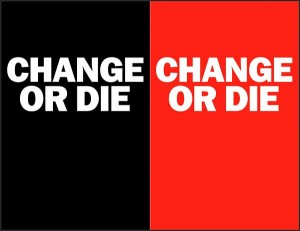
Change in business for a better business health correlates to change in your own behavior for personal health. The fierce business environment today leads to great pressures for success. With technology and internet taking its toll throughout businesses around the globe and playing a key role in business transactions, speed is vital for business success. Business executives are always on their toes to lead a lifestyle of constant intensity and fighting to win against competitors and winning the customer. This leads to many health issues amongst business executives. Even though statistics show that approximately 600,000 people have bypass heart surgery every year with approx 1.3 million heart patients to have angioplasties (procedure to improve blood flow to the heart and temporarily decreasing, all totaling to around 30 billion dollars, people still have a hard time of changing their behavior.
In business it is no longer about strategy, structure, culture or systems; it is about changing the behavior of people. To that extent, the title, “Change or Die”, literally means, “You either change your behavior in business, or you will die of a heart attack.”
With those numbers, people are seldom to change even after a crisis such as a heart attack.
Alan Deutschman speaks about in order to change people’s behavior, we need to talk to people’s feelings, motivate them to change. We don’t tell them to change because they will certainly not, and that is a consensus of 9 to 1 that people will not change in favor of 9.
He says that emotional persuasion to motivate change is not taught in business schools or in companies where professionals such as engineers, scientists, managers, lawyers, accountants, doctors, etc are too focused on day to day concrete analytical work. Professionals do not see the importance of emotional, psychological stability and turbulence to be important to business results.
So how do we get people to change their behavior to save their businesses and most importantly to save their lives?
The Ormish Program lead by Dr. Dean Ornish, professor of medicine at the University of California San Francisco, founder of the Preventative Medicine Research Institute, in Sausalito, California, has changed the motivation for change from the fear of dying, into the joy of living and feeling good about yourself. This change of motivation speaks to the feelings of people of chronic disease in changing their frame of thought. In neuroscience, people think of concepts in their own mind frame as facts that don’t fit their mind frame often do not make sense. Persuading someone to change is not about giving facts to people, it is about changing their mind frame of thought or direction by making them feel good about themselves.
But it is not always about changing the mind frame, but creating a radical and instant change. Organizations and people tend to succeed more when instant and radical changes take place rather than slow and gradual change. This leaves people to be emotionally distressed because of impatience that they do not succeed. Radical change is important to instantly change behavior.
Changing behavior also needs support through the process of transformation. Without support, change will most likely not succeed.
Lastly, change deals with one’s brain. The brain of the human being has been discovered as a plastically muscle that can be shaped throughout our lifetime with constant practice and usage. Change can be stimulated by what posit science calls a, “fifth day strategy,” meaning that employees within organizations spend 1 day to complete a task out of their comfort zone. For an example, software engineers work in marketing or designers involved in business functions such as accounting and operations.
Innovation and creativity can be achieved when people use both sides of their brain and intelligence rather than being controlled, told what to do, and work within corridors and boundaries.
We all must learn to master the art of change in order for us to have a healthy life in business and in our personal health. An important fact is that for heart patients, it is “change or die”, but for people with no heart problems and live life into our 80s, it is about, “change or lose your mind.”
We all must understand that we need to master the art of change to consistently live “the feel-good life”.